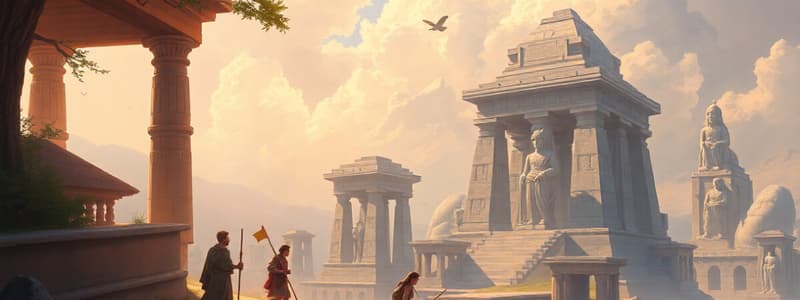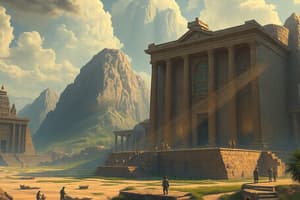Podcast
Questions and Answers
What was a significant contribution of Ancient Greece to modern society?
What was a significant contribution of Ancient Greece to modern society?
- Agricultural advancements
- Democracy and philosophical thought (correct)
- Religious texts
- Road engineering techniques
Which of the following characterized the military and political landscape of Ancient Rome?
Which of the following characterized the military and political landscape of Ancient Rome?
- Isolationist policies limiting trade
- Frequent democratic elections within provinces
- Development of a vast empire with extensive road networks (correct)
- Strong reliance on mercenaries
What role did Confucianism play in Ancient China?
What role did Confucianism play in Ancient China?
- It encouraged a focus on military conquests.
- It contributed to a weaker social hierarchy.
- It established dynastic rule as a central governance idea. (correct)
- It was the primary philosophy behind trade practices.
Which aspect did not significantly influence the rise and fall of ancient civilizations?
Which aspect did not significantly influence the rise and fall of ancient civilizations?
What characterized the Golden Age of Athens?
What characterized the Golden Age of Athens?
What was a significant turning point in the development of early human societies?
What was a significant turning point in the development of early human societies?
Which of the following civilizations was known for its city-states and the development of cuneiform writing?
Which of the following civilizations was known for its city-states and the development of cuneiform writing?
Which civilization is noted for its monumental architecture including pyramids and temples?
Which civilization is noted for its monumental architecture including pyramids and temples?
What characterized the urban planning of the Indus Valley civilization?
What characterized the urban planning of the Indus Valley civilization?
Which type of evidence is NOT primarily used in the study of prehistoric periods?
Which type of evidence is NOT primarily used in the study of prehistoric periods?
The role of pharaohs in ancient Egypt was primarily that of what?
The role of pharaohs in ancient Egypt was primarily that of what?
What major innovation is attributed to ancient Mesopotamia?
What major innovation is attributed to ancient Mesopotamia?
Which civilization developed a writing system that remains undeciphered to this day?
Which civilization developed a writing system that remains undeciphered to this day?
Flashcards
Prehistoric Period
Prehistoric Period
The period before written records, studied through archaeological evidence.
Development of Agriculture
Development of Agriculture
The process of establishing permanent settlements, cultivating land, and raising livestock. Led to the rise of civilizations.
Ancient Civilizations
Ancient Civilizations
Ancient civilizations like Mesopotamia, Egypt, Indus Valley, and China that developed complex societal structures, advanced technology, and written systems.
Mesopotamia
Mesopotamia
Signup and view all the flashcards
Ancient Egypt
Ancient Egypt
Signup and view all the flashcards
Indus Valley Civilization
Indus Valley Civilization
Signup and view all the flashcards
Cuneiform
Cuneiform
Signup and view all the flashcards
Irrigation
Irrigation
Signup and view all the flashcards
Dynastic rule
Dynastic rule
Signup and view all the flashcards
Daoism
Daoism
Signup and view all the flashcards
Golden Age of Athens
Golden Age of Athens
Signup and view all the flashcards
Roman Republic
Roman Republic
Signup and view all the flashcards
Decline and Fall of the Roman Empire
Decline and Fall of the Roman Empire
Signup and view all the flashcards
Study Notes
Overview of Ancient History
- Ancient history encompasses the period from the earliest humans to the beginnings of recorded history, roughly spanning from the emergence of humankind to the development of complex civilizations and empires.
- The study of ancient history relies on archaeological evidence, written records, and other sources to understand human societies, cultures, and their interactions.
Prehistoric Period
- This period predates written records and is primarily studied through archaeological findings.
- Early humans (Homo habilis, Homo erectus, Homo neanderthalensis, Homo sapiens) developed increasingly sophisticated tools and technologies.
- Migrations and adaptations to different environments were prominent aspects of human development.
- The development of agriculture marked a significant turning point, leading to settled communities and the emergence of civilizations.
- Cave paintings and other art forms offer insights into beliefs, practices, and social structures of prehistoric societies.
Ancient Civilizations
- The rise of complex societies led to the creation of significant civilizations.
- Mesopotamia, Egypt, Indus Valley, and China are examples of early civilizations that developed advanced systems of governance, agriculture, writing, art, and architecture.
- Agricultural surplus and population density fueled the development of cities and organized social structures.
- These civilizations often developed elaborate religious and political systems.
- Notable advancements in mathematics, astronomy, and medicine emerged within these societies.
Key Ancient Civilizations: Mesopotamia
- Located in the Tigris and Euphrates river valleys.
- Developed cuneiform writing, a fundamental step in human communication.
- Known for its city-states and powerful rulers.
- Key innovations: irrigation systems, the wheel, and early forms of law.
Key Ancient Civilizations: Egypt
- Situated along the Nile River.
- Famous for its monumental architecture, including pyramids and temples.
- Developed a complex religious system with pharaohs as divine rulers.
- Advancements in mathematics, astronomy, and medicine.
- Hieroglyphic writing system.
- Elaborate burial practices and beliefs about the afterlife.
Key Ancient Civilizations: Indus Valley
- Located in present-day Pakistan and northwest India.
- Known for its sophisticated urban planning, including grid layouts and drainage systems.
- Developed a writing system that remains undeciphered.
- Evidence of advanced trade networks.
Key Ancient Civilizations: China
- Developed along the Yellow River.
- Contributed significantly to philosophy (Confucianism, Daoism).
- Dynastic rule shaped Chinese history.
- Advancements in technology and agriculture.
Ancient Greece
- Known for its significant contributions to philosophy, art, and democracy.
- Development of city-states and intense competition.
- Influenced Western thought and culture.
- Golden Age of Athens produced significant thinkers like Socrates, Plato, and Aristotle.
- Military and political prowess.
Ancient Rome
- Developed from a small city-state to a vast empire.
- Extensive road networks connected its provinces.
- Legal systems, architecture, and engineering had a profound impact on the Western world.
- Roman Republic was a pivotal institution.
- Decline and fall of the Roman Empire was a major transition in history.
Other Important Aspects of Ancient History
- Warfare and conflict between societies were common occurrences.
- Trade and cultural exchange significantly influenced civilizations.
- Religious and philosophical ideas profoundly shaped the development of cultures.
- Social hierarchies and structures varied between civilizations.
- Environmental factors played roles in the rises and falls of ancient civilizations.
Studying That Suits You
Use AI to generate personalized quizzes and flashcards to suit your learning preferences.




